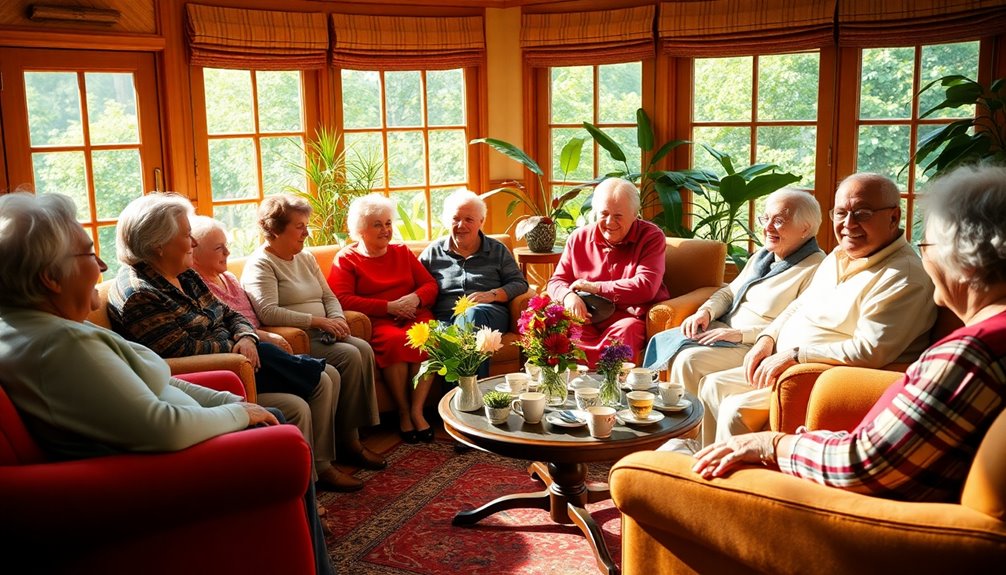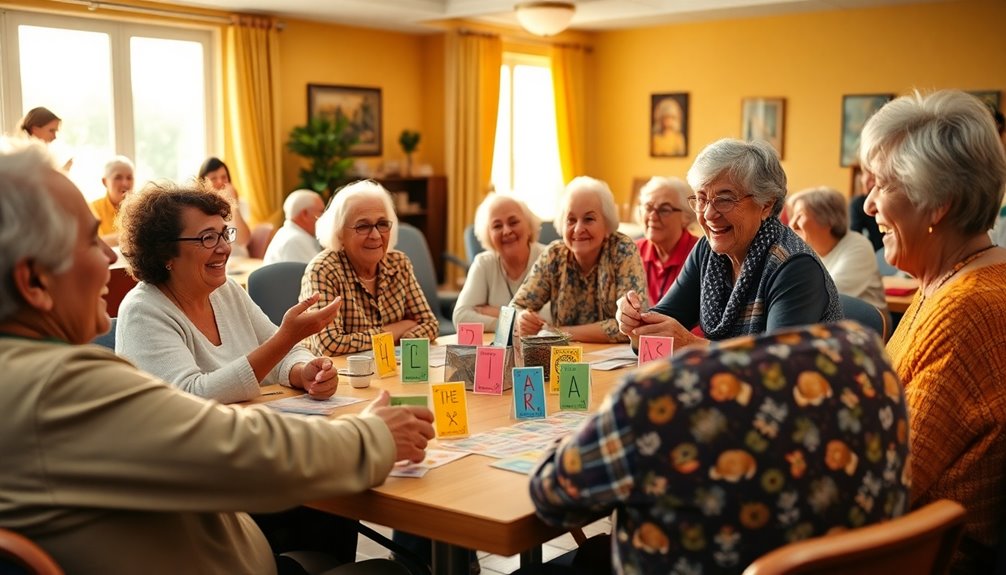Connecting seniors through language enriches their lives and fosters meaningful connections. By using clear, simple language and engaging in face-to-face interactions, you create an environment where seniors feel comfortable expressing their needs. Introducing technology can bridge generational gaps and enable communication with younger family members. Activities like trivia games, arts and crafts, and group classes promote camaraderie and combat cognitive decline. Incorporating humor makes learning enjoyable and enhances engagement. These approaches not only empower seniors but also improve their emotional well-being. To discover more about enhancing connections with seniors, explore the various strategies that can make a difference.
Key Takeaways
- Language learning fosters socialization among seniors, enhancing their communication skills and reducing feelings of isolation.
- Structured video chats connect seniors with language students, creating meaningful interactions and friendships.
- Engaging in bilingual activities can stimulate cognitive functions and protect against dementia.
- Incorporating humor in language learning sessions promotes enjoyment and enhances engagement, helping seniors connect better.
- Technology training empowers seniors to communicate with family and friends, strengthening their community ties.
Importance of Effective Communication

Effective communication plays an essential role in guaranteeing that seniors receive the care they need. By understanding their medical history, daily routines, and special needs, you can help care providers tailor their approach to fit each senior's unique preferences and personality. It's imperative to keep family members involved, as they can offer valuable insights into the senior's needs and preferences.
Regular communication helps you identify any changes in a senior's behavior or health, allowing for timely intervention. This proactive approach prevents misunderstandings among care providers, family members, and other healthcare professionals, making sure everyone is on the same page. Remember, seniors might struggle to express their needs or may be reluctant to ask for help, so your role in facilitating open dialogue is fundamental. Additionally, effective communication promotes timely intervention by recognizing changes in behavior or health, which is essential for quality care.
Moreover, recognizing patterns of behavior can help in understanding a senior's emotional and physical needs more effectively. Active listening is key. By truly hearing what the senior has to say, you can address their concerns effectively. Using clear and simple language helps eliminate confusion and guarantees they grasp their care plans. Ultimately, effective communication empowers seniors, fosters trust, and enhances their overall well-being, assuring they receive the care they truly deserve.
Adapting to Generational Gaps

Bridging the generational gap in communication is essential for fostering connections between seniors and younger individuals. You'll quickly notice that diverse communication styles play a significant role in these interactions. Traditionalists often prefer formal, structured conversations, while Baby Boomers lean towards face-to-face meetings. In contrast, Millennials and Gen Z embrace digital communication, such as texting and social media.
To adapt effectively, customize your communication approach. For example, provide detailed reports for Baby Boomers and visual summaries for younger generations. Introducing seniors to technology can also help; consider teaching them how to use smartphones or video calling platforms. Additionally, encourage face-to-face conversations to strengthen connections that technology may sometimes hinder. Technology can connect seniors with younger family members, enriching these interactions. Understanding how to leverage social media can also enhance these connections by making it easier for seniors to engage with younger generations online.
Be mindful of language differences too. Avoid jargon and clarify terms that might lead to misunderstandings. Patience is key, especially when conversing with seniors who might struggle with cognitive deficits or hearing issues. By understanding these generational differences and adapting your communication style, you can build stronger relationships and foster a sense of connection across age groups.
Supportive Communication Strategies

Understanding generational differences in communication sets the stage for using supportive strategies that enhance interactions with seniors. To foster meaningful conversations, utilize active listening techniques. Maintain eye contact and avoid distractions like your phone. Nod or affirm with simple phrases to show you're engaged. Effective communication is essential to overcome barriers and improve the quality of conversations. Incorporating regular physical activity into daily routines can also enhance overall mood and cognitive function in seniors.
Here's a helpful overview of key strategies:
| Strategy | Description | Implementation |
|---|---|---|
| Active Listening | Show attentiveness through eye contact and full attention. | Minimize distractions and respond affirmatively. |
| Simple and Clear Language | Use concise language and avoid jargon. | Keep sentences short and direct. |
| Non-Verbal Communication | Use positive body language and expressions. | Maintain open posture and warm smiles. |
| Patience and Individualization | Allow seniors time to express themselves. | Adjust your approach based on their comfort.
Creating a Conducive Environment

Creating a conducive environment for seniors involves cultivating a warm and inviting space where they feel comfortable and respected. To achieve this, consider these key strategies:
- Promote a Friendly Atmosphere: Encourage a relaxed classroom vibe to help reduce anxiety. Avoid timed tests, and give seniors ample time to complete activities. Incorporating elements of executive function can also help seniors manage their learning processes more effectively.
- Utilize Life Experience: Tap into their rich life experiences. Encourage sharing, as this not only enriches learning but also fosters connections among peers. This approach leads to deeper insights that enhance classroom discussions.
- Accommodate Learning Styles: Be flexible with their learning patterns. Allow note-taking and provide explicit explanations, especially for grammar. Also, accommodate any physical needs they may have.
- Foster Motivation and Confidence: Focus on intrinsic motivations, like socialization and intellectual enjoyment. Minimize error correction and emphasize positive progress to boost their confidence.
The Role of Humor

A warm and inviting environment sets the stage for effective learning, but adding humor can elevate the experience even more. When you incorporate humor into your interactions, you not only make learning enjoyable but also tap into numerous physical and cognitive benefits. Laughter increases blood flow and boosts your cardiovascular health, while also enhancing immune function through the release of endorphins. This gentle form of exercise helps improve respiratory function and reduces stress hormones, promoting relaxation. Additionally, laughter acts as a natural painkiller, which can further enhance the overall well-being of seniors engaged in language learning. Furthermore, engaging in positive thinking can foster mental well-being, which complements the benefits of humor.
Moreover, humor exercises your brain, enhancing cognitive abilities like memory and creativity. It stimulates learning centers, helping you retain information better in a lighthearted context. This playful approach promotes linguistic flexibility, making language learning more adaptable and fun.
On a social level, humor serves as a universal language that transcends cultural barriers, fostering emotional connections and strengthening relationships. It helps you overcome social obstacles, promoting interaction with peers and creating a sense of community, especially in assisted living settings.
Empathy in Communication

Empathy in communication is essential for fostering meaningful connections, especially among seniors. When you practice empathy, you help older individuals feel heard and valued, greatly enhancing their emotional and psychological wellbeing. This not only leads to improved health outcomes but also encourages open discussions about their needs. Additionally, fostering empathy in healthcare relationships can lead to increased adherence to treatment plans among older patients. Understanding the signs of emotional abuse can also be beneficial in addressing the unique challenges faced by seniors in vulnerable situations.
Here are some effective strategies for empathic communication:
- Use Reflective Listening: Repeat back what you hear to show understanding. Phrases like "What I hear you saying is…" can be helpful.
- Validate Emotions: Use the formula "You feel… because…" to accurately name and connect with their feelings.
- Clarify Information: Ask for further details with questions like, "Is that right?" to guarantee you fully understand their perspective.
- Maintain Non-Verbal Engagement: Keep eye contact, use appropriate gestures, and create a calming environment to reinforce your presence and attentiveness.
Language Learning Considerations

Language learning for seniors comes with unique considerations that can greatly influence their success and enjoyment in the process. Understanding these factors can help you or your loved ones thrive in a language class.
| Consideration | Description | Tips for Success |
|---|---|---|
| Motivation and Participation | Seniors often join classes for socialization, personal growth, and travel. | Focus on topics related to family life. |
| Cognitive and Memory | Cognitive decline affects memory; use memory aids like visuals and mnemonics. | Repeat and recycle vocabulary regularly. |
| Social and Psychological | A friendly atmosphere reduces anxiety and encourages participation. | Foster friendships and avoid timed tests. |
Additionally, it's important to recognize that bilingual older adults exhibit greater protection against dementia and improved cognitive functions, which can enhance their motivation to learn a new language. Engaging in language learning can also help combat cognitive decline, offering both mental stimulation and social interaction that are beneficial for overall well-being.
Engaging Activities for Seniors

Engaging seniors in meaningful activities not only enhances their language learning experience but also enriches their overall well-being. By incorporating a variety of activities into their routines, you can help them stay active, stimulated, and socially connected. Here are some engaging activities to contemplate:
- Physical Health Promotion: Join group exercise classes like yoga, tai chi, or water aerobics. These options accommodate different fitness levels and help improve cardiovascular health and balance. Regular participation in these activities can significantly reduce the fall risk among seniors. Additionally, engaging in physical activities fosters collective problem-solving within the community, enhancing social bonds.
- Cognitive Stimulation: Participate in trivia games, book clubs, or crossword puzzles. These activities challenge the mind, promote social interaction, and keep cognitive functions sharp.
- Creative Expression: Encourage seniors to explore arts and crafts, music, or dancing. Activities like painting, singing, or jewelry-making not only foster creativity but also provide emotional uplift and social connections.
- Social Interaction: Organize group walks, communal dining events, or social clubs based on shared interests. These activities create a sense of belonging and help build friendships among seniors.
Incorporating these engaging activities into seniors’ lives can lead to a richer, more fulfilling experience while they learn and connect through language. These interactive experiences not only stimulate cognitive function but also foster a sense of community among participants. Many seniors find joy in participating in group discussions, book clubs, or language classes held at senior centers for social activities. By promoting communication and collaboration, these initiatives can significantly enhance the overall well-being of older adults, making their golden years more vibrant and connected.
Building Meaningful Connections

Building meaningful connections among seniors and younger generations fosters a sense of community and belonging. You can facilitate these connections through structured video chats, where Brazilian students practice English with seniors in retirement homes. This setup benefits everyone; students enhance their language skills, while seniors engage in conversations that help reduce feelings of isolation. Speaking Exchange creates opportunities for seniors to share their life experiences, enriching the conversation. Moreover, engaging in these discussions can also help seniors develop better communication skills, which can further enhance their interactions.
To guarantee effective communication, you should use clear speech, maintain eye contact, and ask open-ended questions. These techniques respect seniors' autonomy and improve understanding without sounding patronizing. Keeping backgrounds quiet and distractions minimal enhances the quality of interactions.
Cultural exchange plays a crucial role in these connections. Sharing experiences and insights from different backgrounds enriches conversations and promotes respect for diversity. You can support seniors' linguistic needs by providing multilingual resources and personalized care plans that reflect their backgrounds.
Integrating technology is also necessary. Teaching seniors to use devices like iPads allows them to connect with family and friends, reducing isolation. By encouraging continuous learning through tech training programs, you help seniors stay engaged and connected, ultimately building a vibrant, supportive community.
Frequently Asked Questions
How Can I Encourage Seniors to Practice Speaking Spanish More Often?
To encourage seniors to practice speaking Spanish more often, invite them to join local conversation groups or cultural events. Set up weekly coffee chats where they can engage in relaxed discussions. Suggest using language exchange apps like Tandem, letting them connect with native speakers. Encourage watching Spanish movies or listening to podcasts together to spark conversations. Celebrate their progress and create a supportive environment that makes speaking Spanish enjoyable and rewarding.
What Resources Are Available for Seniors Learning Spanish Online?
When you're learning Spanish online, you've got plenty of resources at your fingertips. You can access interactive lessons, online books, and audio exercises tailored to your level. Virtual classrooms foster engagement through video conferencing and screen sharing. Plus, you'll find cultural activities and social opportunities to enhance your learning experience. Many programs offer personalized lessons and additional materials, making it easier for you to practice and improve your Spanish skills effectively.
Are There Specific Cultural Aspects of Spanish to Share With Seniors?
You can share cultural aspects like the importance of family and community in Spanish culture. Discuss how elders are respected for their wisdom and often play a central role in family gatherings. Highlight vibrant festivals like Semana Santa and La Tomatina, emphasizing the joy of community celebrations. Encourage conversations about traditional foods, like paella and tapas, which bring people together, enriching their cultural experience and fostering connections with younger generations.
How Can I Assess a Senior's Progress in Learning Spanish?
To assess a senior's progress in learning Spanish, you can use various methods. Start with informal conversations to gauge their fluency and comprehension. Incorporate task-based assessments that mimic real-life situations. Utilize standardized tests like the Batería Woodcock-Muñoz or the STAMP 4S for a more structured evaluation. Regularly review vocabulary and cultural understanding through quizzes or discussions. This way, you can track their growth effectively and adjust your approach as needed.
What Are Some Fun Games to Teach Spanish to Seniors?
Did you know that learning a new language can enhance cognitive function by up to 30% in older adults? You can make Spanish lessons enjoyable for seniors with games like Bingo or Charades, where they'll guess words or act them out. Try Pictionary for creativity or Scavenger Hunts to apply vocabulary practically. These interactive activities not only boost language skills but also foster social connections, keeping everyone engaged and motivated in the learning process.









